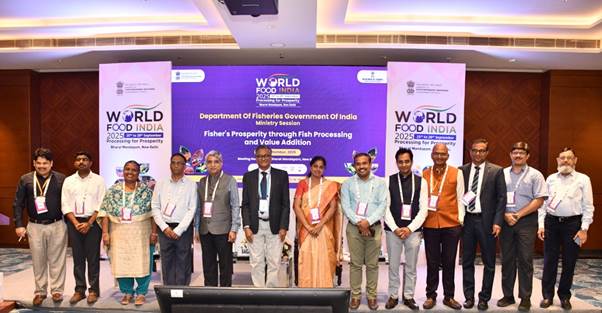FishTech: Innovations For Fishers’ Prosperity; Dr. B. K. Behera, Chief Executive, NFDB, presented advanced technologies including AI-enabled systems and drone applications, along with RAS, Biofloc, Aquaponics, and inland cage culture clusters, for sustainable aquaculture

FinTech BizNews Service
Mumbai, September 27, 2025: The Department of Fisheries (DoF) under the Ministry of Fisheries Animal Husbandry and Dairying (MoFAHD) organized a technical session titled “Fish Tech for Fishers’ Prosperity: Innovations in Processing and Value Addition” on the sidelines of World Food India 2025 at Bharat Mandapam, New Delhi. Aligned with Prime Minister Shri Narendra Modi’s call to strengthen marine product processing through modern plants, cold chains, and smart harbours, the session brought together experts, policymakers, and industry stakeholders. Discussions centered on innovative technologies and strategic interventions to minimize post-harvest losses, enhance quality, boost productivity, and promote exports in the fisheries sector.
Shri Sagar Mehra, Joint Secretary, DoF, in his keynote address, underscored the transformative role of FishTech in reducing post-harvest losses, ensuring quality, and promoting exports. Highlighting fish as a crucial food to fight hunger, he noted that more than 3 crore Indians depend on the sector for their livelihood. He further acknowledged women’s pivotal role in fisheries, both in production and in strengthening the country’s nutritional security. Shri Mehra also highlighted the development of a National Framework for Traceability in collaboration with MPEDA and EIC (Export Inspection Council) to meet global standards in the sector. Dr. B. K. Behera, Chief Executive, NFDB, presented advanced technologies including RAS, Biofloc, Aquaponics, and inland cage culture clusters, along with AI-enabled systems and drone applications for sustainable aquaculture. While Mr. Kari Logason, General Manager at Nautic (an Icelandic Naval architecture firm), joined the session virtually and shared insights on modern deep-sea fishing vessels and AI-integrated processing systems, expressing interest in collaborations to design customized vessel technologies for India.
During the technical session, Dr. J. S. Reddy, Additional Director, Export Inspection Council, stressed upon the importance of quality standards and food safety, outlining the implementation of a Residue Monitoring Plan to ensure compliance with international norms. Dr. Bindu J., Principal Scientist, ICAR-CIFT, presented global innovations in fish processing and packaging, including tuna traceability, advanced chilling methods and automation in processing. Sustainable materials and smart sensors were emphasized upon to enhance traceability and product integrity. While Dr. Geethalakshmi, Principal Scientist, ICAR-CIFT, highlighted the export potential of freshwater fisheries, identifying high-demand species and product forms across major destinations, while noting infrastructure gaps and the need for greater value addition.
The session also underscored the importance of integrating ESG (Environmental, Social and Governance) principles in fisheries to align with Viksit Bharat and global sustainability goals, emphasizing that ESG has become a market imperative. Discussions focused on retail transformation under “Blue Revolution 2.0”, with a strong call for strengthening cold chain infrastructure, processing facilities, and digital market access. Additionally, the need to promote value-added seafood products from underutilized species and by-products was highlighted to reduce post-harvest losses and boost exports.